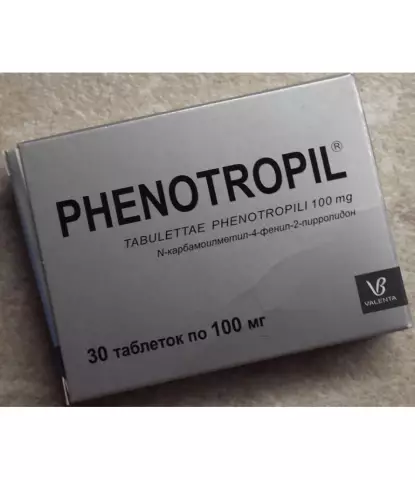- Author Rachel Wainwright [email protected].
- Public 2023-12-15 07:39.
- Last modified 2025-11-02 20:14.
What can replace Phenotropil: analogues
In general medical practice, a group of special drugs is used that have a positive effect on the quality of life. They directly affect mental activity, increase the brain's resistance to stress and aggressive environmental factors, improve memory, help focus, and also have a number of other pharmacological effects. Such funds are included in the group of nootropic drugs.
One of the representatives of this group is Phenotropil. It is distinguished by neuroprotective properties and promotes accelerated recovery of brain cells after damage of various origins. Phenotropil is used to correct membrane, neuronal, molecular and cellular disorders.

Phenotropil was created by scientists for use in aerospace medicine. His task was to improve the cognitive functions of the brain, which include: attention, memory, the ability to learn, learn and understand, as well as work with incoming information. The state of constant stress and psycho-emotional stress (exams, increased work load or simply difficult family relationships), as well as adaptation to various environmental conditions, are difficult for the body. This leads to negative consequences:
- insufficient cerebral circulation;
- increased anxiety;
- fatigue;
- insomnia;
- dizziness and headache;
- distracted attention, etc.
Such symptoms negatively affect a person's daily life and can lead not only to problems at work or in the family, but also negatively affect health.
The positive effect of Phenotropil has been proven thanks to research, however, science does not stand still, and today there are analogues of the drug that are not inferior, and possibly superior, the effects of this drug. Since Phenotropil disappeared from pharmacies or was discontinued, the search for an alternative is very acute not only for doctors, but also for patients, and in order to understand which medicine can adequately replace it, you must first understand the effect of Phenotropil on the body from different sides.
Action and result of application
Nootropic drug normalizes cerebral circulation, and therefore improves metabolism in nerve cells.
The medicine has several effects at once (multimodality):
- increases the vitality and energy of the body;
- activates the work of the brain;
- help concentrate attention and memory;
- facilitates the learning process;
- increases physical endurance and gives vigor;
- balances mental and emotional state;
- improves mood, etc.
According to the manufacturers of the drug, its course administration increases the body's protective properties against stress at high psychological and physical stress.
According to patient reviews, the drug has unpleasant side effects, including insomnia, increased anxiety, increased blood pressure, etc.
Fortunately, you can find safer analogs, which, moreover, will be comparable in effects to Phenotropil.
Phenotropil's analogs
Mexidol
Mexidol is a popular domestic antioxidant with neuroprotective and nootropic properties. The only drug with the active ingredient ethylmethylhydroxypyridine succinate, the effectiveness of which has been confirmed by the results of a randomized controlled clinical trial.
The drug has many positive effects, being a multimodal neurocytoprotector. Patients taking Mexidol report improved attention and memory, decreased stress and even increased mood. This is due to the fact that Mexidol increases the dopamine content in the brain. After taking it, patients feel a sedative effect, a decrease in anxiety.
Mexidol improves metabolism and blood supply to the brain, improves microcirculation and rheological properties of blood, reduces aggregation, that is, "sticking" of platelets. An improved blood supply leads to an improved oxygen supply to the organs.
In addition, the drug helps all cells of the body, in particular, the cells of the brain and heart, to function normally under conditions of oxygen starvation. This increases the endurance of a person and this is what caused the use of Mexidol in athletes with high physical exertion.
Mexidol will also help with sleep disorders. The drug restores normal sleep and wakefulness cycles.
Due to such a number of effects, Mexidol has found its application in many fields of medicine: neurology, cardiology, sports medicine and others. An extensive evidence base and good patient tolerance allows this drug to be widely used in clinical practice.

Glycine
Glycine can also be considered as a substitute for Phenotropil. The action of the tablets is manifested in improving well-being and health in general:
- deep sleep;
- pronounced anti-stress effect;
- restores metabolic processes in the nervous tissues of the brain.
It is used for pathologies caused by oxygen deprivation.
Piracetam
This drug can also be considered an analogue of Phenotropil, the drug optimizes the thought processes and mental performance of a person.
Picamilon
The medicine regulates the functions of the nervous system, improving blood circulation in the brain and reducing arterial tone. It also affects the emotional sphere. It is prescribed as a nootropic and vasoactive agent for acute and chronic cerebral hypoxia and vegetative dystonia. Regular use normalizes heart rate and stabilizes blood pressure.
Among the listed list of Phenotropil analogues, the best, perhaps, can be called Mexidol, since this drug not only has a multimodal mechanism of action and has an impressive evidence base, but also has a high safety profile, proven over more than 20 years of clinical practice.
Found a mistake in the text? Select it and press Ctrl + Enter.






